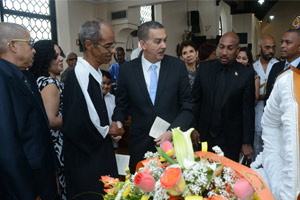media_artricles :: 2013
Bailey appreciation, via Keating
Fazeer Mohammed :: Trinidad Express :: 16.12.2013We are not alone when it comes to failing to appreciate people when they are still alive.
However the deficiency becomes more acutely embarrassing when outsiders seem to have a greater appreciation of our own, especially when one of those foreigners comes into our own backyard and provides more information and shows more admiration and compassion than we do for a world-beating son-of-the-soil living among us.
In Another Bloody Day In Paradise!, a beautifully-written account of the England cricketers’ tour of the West Indies in 1981, British sportswriter Frank Keating tells of a chance meeting with one of the sporting heroes of his youth, an encounter that occurred as he went in search of sustenance in Woodbrook after midday showers halted play on the fourth day of the first Test at the Queen’s Park Oval.
Keating succumbed to pneumonia at the age of 75 last January, so obviously I don’t have his permission to reproduce the relevant excerpt from the book. But I’ll take the chance anyway because of the timeliness of re-telling a tale of a former sporting superstar living quietly, and apparently contentedly, in the shadows of suburban Port of Spain obscurity:
“The heavy warm rain beats on the hot, tin corrugated roof; otherwise silence, except for the elderly waiter who you do not hear coming, so delicate, soft and fast is he on his feet. But he never stops whistling. Very faintly, but real tunes. Music while he works. A happy man. He is also owner of the restaurant and his name turns out to be E McDonald Bailey.
“It’s probably a generation thing. In our English village...if I sprinted past a pal to be first at the bus stop he’d say, ‘Oo d’you think you are, McDonald Bailey?’ Now here he was, serving my lunch at his Talipot Cafe in Trinidad. His 10.2 seconds broke the world 100-metre record for Britain at Belgrade in 1951 and it stood for five years. Between 1946 and 1953 he held sixteen sprint titles, a record unlikely to be broken.
“He is a charming, cultured man, now grey but still very handsome with a rare and lovely smile. His wife Doris is out the back in the kitchen. She is a cheery Cockney — as she must have been when they first met in the Paramount dance hall in Tottenham Court Road in wartime London. He was in the RAF, she was a WRAC. They have five children, still in England.
“E. McDonald Bailey (E for Emanuel) first left Trinidad for England at eighteen in 1939 to run in the AAA Championships against the likes of Holmes and Sweeney. The boy took nearly two weeks to get to Plymouth in a German banana boat. In 1942 he was coached by Wint and McKenley in Jamaica. In 1944 he joined the RAF and settled in England.
“The first athletics newspaper that whammed into my consciousness was the 100-metre final in the 1948 Wembley Olympics. Remember? When every picture told a story, not gave you a close-up of a panting nostril or whirring ankle. Dillard, Ewell, La Beach, McQuorquodale, Patton...our McDonald Bailey was last and although the Scottish Mac was fourth, the nation sighed for their favourite Trinidadian.
“Getting into the final was a triumph looking back on it. But with three weeks to go my thigh went flat as a pancake. We sorted that out, then with ten days left I got an abscess under my arm, and then, would you believe, laryngitis. Yes, I suppose it might have all been psychological.’
“Four years later, in the Helsinki Games, he was the world’s hot favourite. He took the bronze. ‘I must admit it, I found there was enormous pressure in being favourite. It was wet and I was upset at the lane draw for the final. When the gun went I tensed. I ran half the race tense. Ridiculous! If it had been 105 metres, do you know I might have made it!’ Remigino and McKenley beat him. Last July he sent a cable to Alan Wells congratulating him on his 100-metre Moscow gold medal.
“To a jeering Fleet Street hooha he joined the Rugby League...then in the fifties he left England to become sports organiser for Guyana. Ten years later he returned to Trinidad and worked as promotion manager for Shell. After long spells in London and Dublin he is now back in Trinidad — doing what I daresay he always wanted. At least his smile and that music while you work very much suggest so.
“Waiter, a little more mango in my chutney please.’
“Certainly, sir, right away, sir,’ and no sooner said than done!
“Oo does he think he is, McDonald Bailey?”
It was only in 1982, as a 17-year-old sinking inexorably in the academic quicksand of A-Levels, that Keating’s recounting of the experience made me aware of McDonald Bailey, who died almost two weeks ago at the age of 92 and whose life was celebrated on Friday at All Saints Anglican Church. Thankfully, Basil Ince, a former athlete and Olympian himself, was on hand to provide a fitting account of “Mac’s” accomplishments, while also explaining the circumstances that led to the champion sprinter representing Great Britain instead of the land of his birth.
Amid all the completely justifiable preoccupation with the death of Nelson Mandela, another man of substance, charm and dignity has also left us. A pity that my generation has not appreciated McDonald Bailey in the way that others like Frank Keating did.

Enlarge Image
Remembering ‘Mac’: President of the Republic, Anthony Carmona, centre, Minister of Sport Anil Roberts, second right and president of the Trinidad and Tobago Olympic Committee Brian Lewis, right, at the funeral service for the late athlete McDonald Bailey at the All Saints Anglican Church, Marli Street, Port of Spain, on Friday. —Photo: Ishmael Salandy

Close Window